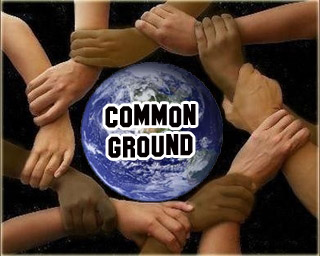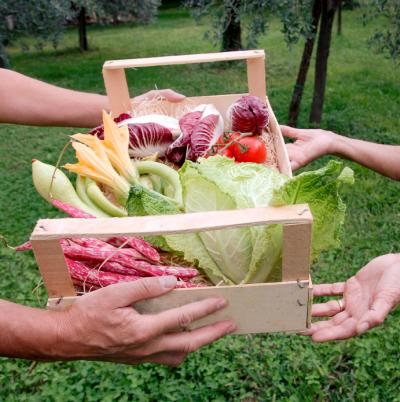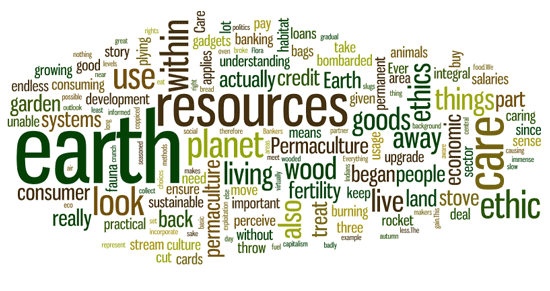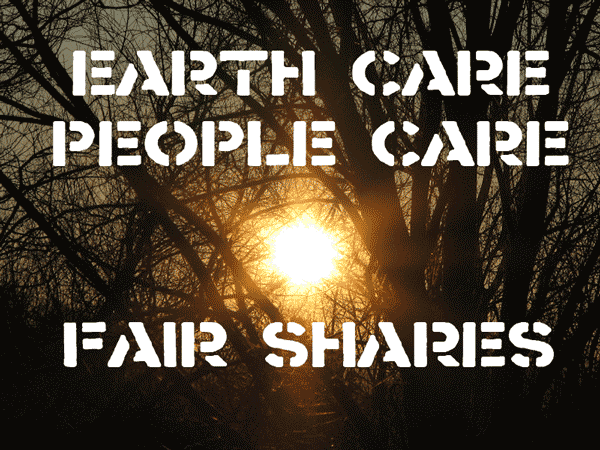Permaculture is underpinned and informed by three ethics, we will take a look at what these ethics mean and why they so important to permaculture and the creation of sustainable systems, and ultimately a permanent culture.
Earth Care
‘Strive to Survive causing as least suffering as possible’
Flux of Pink Indians
The earth is the very thing that gives us life, it sustains and nurtures us, and without the earth we would not exist, we are an integral part of it, and it is an integral part of us.Therefore on a very basic human level we need to look after the earth as it looks after us, any relationship we have beyond this is really usury and exploitative.The care of the earth includes consideration and accommodation of all living things, such as plants, animals, the air that we breathe, the water that we drink, and the soil that provides us with healthy food.We shouldn’t just care for the earth because it makes common sense to ensure a sustainable supply of resources to maintain our lives; I believe that we should care for the earth as a means of actually respecting nature and the planet in its own right.
How to care for the earth
In caring for the earth we really need to begin looking at how we live, how we perceive and use resources and how we can reduce the immense strain that is put on the planet by consumer capitalism and the choices that we make.When I first began thinking about this I broke it up into the different areas of resources usage that we use within our every day lives.The levels of what we actually can do within the restraints of late Capitalism are governed somewhat be social position and economic mobility, those with money and resources can do a lot more than those without, and those with more, use up a great deal more of the planets resources than those will less.The examples I given below are what we do at home that relates to caring for the earth, I given my own example as a means of what can be achieved on a low income.
Flora and fauna
Before we look at the way we use resources it is important to look at how we treat other living creatures.The earth care ethic of permaculture applies to the rights of other living things on the planet and our development and understanding of the acknowledgment that they have a place and a habitat on the earth that we do not own and is not subject to our exploitation for economic gain.This applies to how we treat animals; how we treat the land that we come into contact with and all that live within the habitat of the land.
Food
I grow a good deal of the food that we eat on two allotment plots and a South facing back garden.By employing organic methods of cultivation in a very localised setting we are able to cut out fossil fuel usage to virtually nothing, similarly practical aspects of permaculture ensure that our bits of land are gradually developing fertility with each passing year such as growing plant foods and fertilizers on site where it is needed.We also keep chickens in the back garden which provide us with four eggs everyday, the hens also bring fertility to the garden with their poo and they keep the bugs and slugs down when they are foraging in the growing area over the autumn and winter months.
Fuel and energy use
Before me and my partner were laid off as a result of the Bankers credit crunch we fitted a wood burning stove, the stove is powered by seasoned coppiced wood that we cut from a badly managed wooded area near to the estate that we live on, we also collect wood from a local furniture makers who give us bags and bags of hardwood off cuts that burn for ages.I also do a lot of our cooking on my rocket stove in the back garden and am in the process of making an oven attachment so that we can bake bread in it.Using the wood burning and rocket stoves has significantly reduced our dependence on gas and electric.
Everything else
Ever since the banking sector began plying people with credit cards and loans to pay for the consumer goods that their salaries were unable to, we have been bombarded by an endless stream of goods, gadgets and things for us to buy, throw away, upgrade, and so the story goes. Ever since the banking sector began plying people with credit cards and loans to pay for the consumer goods that their salaries were unable to, we have been bombarded by an endless stream of goods, gadgets and things for us to buy, throw away, upgrade, and so the story goes.I’m sure most people reading this are aware that resources are finite set against the background of an economic system that is acting as if resources are inexhaustible and infinite.If we choose to move away from consuming for consuming sake we really are doing ourselves and the planet a good service.
Earth care for a permanent culture
As part of the ongoing development of a Permanent Culture, the Earth Care ethic is central to the long term fertility and vitality of the earth’s eco systems and all of the flora and fauna that live within these systems. If we looked at Permaculture as an earth repair manual, the earth care ethic would represent a marked charge in our cultural outlook about he we perceive the planet and all that we take from it, therefore, this ethic represents the beginning of our work as we move towards gradual and slow solutions away from the prevailing Neoliberal politics of the self.
People care
People care really begins with us as human beings, it then expands out into the relationships that we have with other people, such as our families, friends, partners and those who we know and interact with on a daily basis.
Its about you, your neighbours, the wider community, and the whole world!
 There are a few elements of people care that we need to consider, caring for people is about having access to resources that are necessary for our existence so that we are able to live a healthy and harmonious life, within this context the people care ethic is really about both our own well being and the well being of other individuals and communities.
There are a few elements of people care that we need to consider, caring for people is about having access to resources that are necessary for our existence so that we are able to live a healthy and harmonious life, within this context the people care ethic is really about both our own well being and the well being of other individuals and communities.
How to care for people
In caring for people we really mean connecting on an emotional and social level with those around us to ensure mutually beneficial relationships can be fostered and developed. On an emotional level we can care for people by helping them to ensure that they are able to access things that are likely to help with well being, this can be something as simple as the sharing of ideas about nutrition, sharing our knowledge of food growing, medicinal plants and herbs and methods of relaxation.
One huge leap forward that we could all make in relation to people care is to adopt an anti-competitive and pro-cooperation approach in our everyday interactions and engagements, instead of thinking ‘what will I gain from this’ we need to start thinking ‘What can we achieve from this’ I’m sure many who are reading this will have heard the phrase ‘Putting people before profit’ this is exactly what the people care ethic of permaculture means.
We have moved a long way away from our community roots, and its time that we moved back to them, and developed long lasting and fruitful relationships on the way with those that we know and those whom we will meet in the future.
People care and the development of a Permanent Culture
 Without the positive interaction and synergy that we are able to bring about through the people care ethic, we would simply be in a world composed of uncaring and selfish individuals, as we are at present. In order to change ourselves, our communities, and the wider society the people care ethic asks us to consider each other and our needs, at present this is a difficult way to think and adopt when everyone around us seems to be out for whatever they can get and only interested in servicing number one.
Without the positive interaction and synergy that we are able to bring about through the people care ethic, we would simply be in a world composed of uncaring and selfish individuals, as we are at present. In order to change ourselves, our communities, and the wider society the people care ethic asks us to consider each other and our needs, at present this is a difficult way to think and adopt when everyone around us seems to be out for whatever they can get and only interested in servicing number one.
The cult of Individualism that is part and parcel of Neoliberal Capitalist thought has tried to teach us that there are only individuals as opposed to collectivism and commonality. The philosophy of individualism is an illusion, the human world can only shape and move by collective action alone, and it is this collective action that is at the heart of people care in terms of how we interact and achieve things as human beings. Capitalism will be unable to operate in the reckless way it does if we have strong communities and stronger links with our families and those around us, Capitalism requires fragmentation for it to work effectively, the people care ethic goes against this fragmentation and has the ability to bring people together.
Once we begin to look at relationships and people through the People Care ethic, a whole new world of connection and development becomes possible, and it is by caring for ourselves and others that we are able to expose the false illusion of individualism. On a personal level and in the context of developing a Permanent culture for the future, the people care ethic represents a return to being human as opposed to being a consumer, a worker, or whatever else tag has attached itself to us on the way. Capitalism and the Politics of individualism has led us down a dangerous garden path, it tries to make us believe that only our own selfish material gains are important, this attitude and way of being is largely responsible for the wholesale rape of the planet in that it makes it OK and justifiably to just keep buying and replacing stuff with more stuff without a care or concern about the sane resource use and equality.
Fair shares
“Live simply so that others may simply live.”
Mahatma Gandi
Fair Shares
 The phrase ‘Live simply, so that others can simply live’ is a powerful statement that resonates through the fair shares permaculture ethic. This ethic covers a number of considerations, firstly we have to accept that we cannot continue to increase and also sustain the planet, we have to accept that we need limitations to the number of people living on the planet and the resources which we use.
The phrase ‘Live simply, so that others can simply live’ is a powerful statement that resonates through the fair shares permaculture ethic. This ethic covers a number of considerations, firstly we have to accept that we cannot continue to increase and also sustain the planet, we have to accept that we need limitations to the number of people living on the planet and the resources which we use.
We need to curb population and consumption because of the carrying capacity of the planet; the carrying capacity simply refers to the number of organisms that an ecosystem is able to support. The fair shares ethic also means that we need to redistribute surplus resources and the well being that comes from having access to these resources.
For the fair shares ethic to work and function properly, it requires that we interact and cooperate with others through, networking and sharing, community development and offering a fair price for our produce that is affordable to all, , within the fair shares context we should treat others as fairly as we treat ourselves.
In Practice
For those of us who grow food and have experienced gluts in particular produce during the height of the season, this is the perfect situation where the Fair shares ethic naturally appears. When I have gluts of certain types of produce, it means that I have an excess or an abundance of a certain fruit or vegetable, this excess goes beyond what I can take and utilize for my own sustenance and well being so the natural thing for me to do is to give some of it away to those who do not have any of it or trade it with people who have an abundance of something else which I have little or nothing of.
On a wider social level, allotment and food growing collectives and cooperatives are a good way to ensure that resources are fairly distributed amongst members and their families. And for the people that we know that exist outside of these collectives and cooperatives we should really help and encourage them in any ways we can to set up their own groups in their respective areas.
For this ethic to work in practice it requires that we come together with those around us to formulate our ideas and plans before putting them into action, if we move alone on this we will really struggle and would not benefit from the mutual bonds and friendships that would develop from our collective efforts to distribute any surpluses that we may have, and if we move alone, there wont be anyone there for us when we have a shortage of resources.
Fair shares and a future permanent culture
 Without the limitations and redistribution of the fair shares ethic put into practice, we will see little in the way of any change in the world, as the world that we are living in is the complete flip side of the coin to the fair shares ethic.
Without the limitations and redistribution of the fair shares ethic put into practice, we will see little in the way of any change in the world, as the world that we are living in is the complete flip side of the coin to the fair shares ethic.
As we begin to incorporate the fair shares ethic into our lives, let us do so with everyone that we come into contact with from friends, to family, to work friends, and to the wider community, as we do this and begin to get used to sharing what is surplus to our needs, the collective welfare of everyone suddenly begins to come into play, and the more that people see sharing instead of self gain as the way forward, the quicker we can develop a more permanent culture for the future of our selves and the planet that sustains us.
I have noticed that when ever I have shared any of my excess resources with people, that they have always shared there’s with me, even if they have had none to share at the time, sharing is an unconditional act of giving that exists outside of the capitalist way of doing things and it gives people the chance to see giving as something positive that goes beyond the narrow confines of personal individual gain.
Once people begin to share what they have, the divisions of capitalism will begin to fade away as strong and resiresilient communities begin to form and work together to create local food and other resource security, and for a permanent culture to develop, this independence from the control of those who only have their own material interest at heart is a big leap into a possible egalitarian future.


